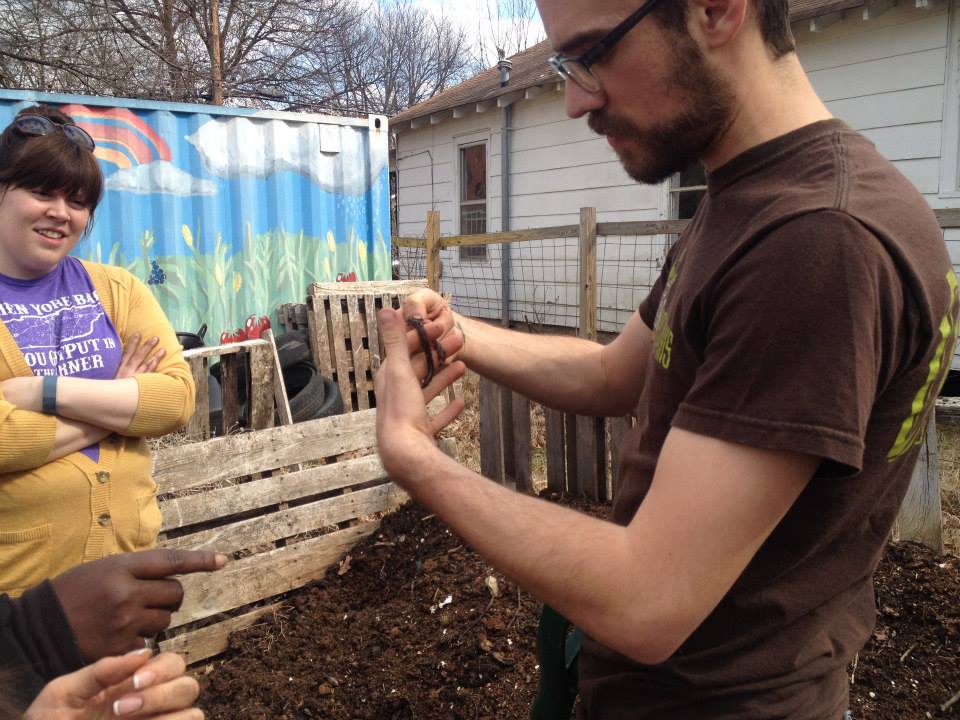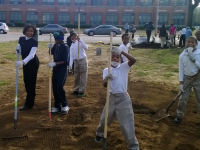It was the start of 2013 in Memphis, Tennessee, when GrowMemphis, a non-profit that supports a local network of community gardens, was ready to cultivate their first batch of seedlings. Their greenhouse, equipped with electronic temperature controls, is designed to create the perfect conditions for budding vegetable plants. But no matter what they tried, their pepper seeds would not sprout. Just when they feared they might lose their baby pepper plants, a local gardener and volunteer at the organization named Nathaniel (who asked that we not use his full name) from North Memphis, suggested trying something different. He took the seedlings home to his own personal garden where he re-planted them in anything he could find—the bottoms of cut-up soda bottles and plastic bags, anything. Lo and behold, the seeds began to sprout.
This is the spirit of GrowMemphis. Born as a project of the Mid-South Center for Peace and Justice in 2007, the initiative’s mission focuses on growing a sustainable local food system through community empowerment. GrowMemphis provides aspiring leaders with the skills, resources and training necessary to run their own successful neighborhood garden projects. Through a recent partnership with ioby, GrowMemphis raised $2,583 for the New Garden Campaign, an initiative to build one new garden in the future. Each year, through both the addition of new and existing gardens, the organization brings together projects focused on a wide range of social issues, such as community health and economic empowerment. Chris Peterson, GrowMemphis’s executive director explained that, through an ever-expanding network, the organization is always benefitting from a broadening knowledge base. Since its beginning in 2007 with just three gardens, GrowMemphis celebrated a total of thirty gardens at the end of 2013, and is looking to reach a new total of forty by the end of this year.
The implications of this extraordinary achievement go beyond the success of the organization itself. In 2010, a survey conducted by the Gallup Organization named Memphis the hungriest city in America, with an astonishing 26% of the metropolitan area’s population reporting insecurity about where their next meal would come from. Emily Holmes, a board member at GrowMemphis and a professor at Christian Brothers University who teaches a course on food issues, explained that the city has a number of food deserts, defined by the USDA as areas where people don’t have access to fresh food or grocery stores with healthy, affordable options. In addition, she described health issues including diabetes and obesity, with rates of prevalence increasing in younger members of the population.
“One thing that community gardens do is provide a source in the neighborhood for fresh produce that people can grow themselves and have available to them immediately,” Holmes said. Additionally, in a city that suffers from urban blight, vacant, neglected properties and absentee landlords, “community gardens can help to beautify neighborhoods. They provide a sign of hope, of something living and growing, and they provide a community gathering place…where people can learn how to work together and advocate for themselves and their own needs.”
GrowMemphis is working diligently to create this type of environment. Just this year, an experienced garden leader teamed up with Homeless Organizing for Power and Equality (HOPE), a group of formerly or presently homeless individuals, to create a community garden. Not only does this space allow the people of HOPE to produce food for themselves, it brings them into the community by providing a place where they can interact and work with those individuals who do have homes. “We want our network to be as diverse as possible,” Chris said. Gardening “gives people something in common that they might not otherwise have.”
Whether they are planning a monthly garden meetings that bring together garden leaders from all sorts of backgrounds, or hosting fundraising parties like the one Emily Holmes hosted with her husband to raise money for the New Garden Campaign, the team at GrowMemphis is breaking down barriers to food access by building strong communities dedicated to working together for a better future in Memphis.
The GrowMemphis campaign is fully funded thanks to donations by people just like you, and you can learn more about your continued support can cultivate this great work in Memphis here.



